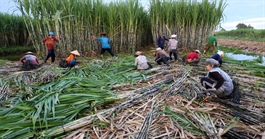Vietnam’s Masan denies exporting Omachi instant noodles with banned chemical to Taiwan
Vietnam’s Masan denies exporting Omachi instant noodles with banned chemical to Taiwan
Vietnam’s Masan Consumer Corporation has denied selling Omachi instant noodle products containing the banned chemical ethylene oxide (EO) to Taiwan and claims it is coordinating with Vietnamese authorities to clarify the issue.

Masan Consumer, one of Vietnam’s leading food and beverage companies, released the statement on Wednesday after Taiwan Food and Drug Administration (TFDA) announced that 1.44 tonnes of Omachi sour shrimp flavor instant noodles imported from Masan contained EO, a chemical that is not yet licensed for consumption in Taiwan.
Specifically, the seasoning packages that accompanied a batch of Omachi instant noodles imported from Vietnam by Taiwan’s Qianyu Co. Ltd. were found to contain 0.195 mg/kg of EO, Taiwan’s Central News Agency (CNA) cited TFDA as reporting on Tuesday.
“This case does not comply with the provisions of Article 15 of the Food Safety and Hygiene Management Law on the standard of tolerance for pesticide residues,” the TFDA said on its website.
It concluded that “the non-conforming goods in the case will be returned or destroyed in accordance with the regulations.”
The Omachin instant noodle in question was among 19 food items named by the TFDA in its list of border inspection violations released the same day and would therefore be returned or destroyed, CNA reported.
A representative of Masan Consumer has denied exporting instant noodles with EO to Qianyu and said the firm is coordinating with the Vietnamese Ministry of Industry and Trade, the Ministry of Health, the Vietnam Sanitary and Phytosanitary Notification Authority and Enquiry Point (Vietnam SPS), and other competent state agencies to verify the matter.
The representative stated that Masan’s exports, including instant noodles, fully meet the quality standards of the countries to which it exports.
“For our distributors and agents, we adopt strict provisions in our distribution contracts that ban exporting products intended for one market to another,” the representative stressed.
As each country has its own food safety standards and regulations, Masan exports different products to different countries in order to fully meet their specific requirements, according to the firm.
The corporation added that it regularly inspects its products and strictly handles violations of its contract regulations.
In Vietnam, Omachi instant noodles meet all local food safety regulations and considered safe for consumption, Masan affirmed.
It also said Masan’s products have been officially exported to the U.S., Canada, Russia, the Czech Republic, China, and Japan.
Meanwhile, the industry and trade ministry has said it will ask Masan to report on the issue and will provide information to the media after verification.
To date, EO and its allowable limits have yet to be included in food safety legislation in Vietnam, the ministry admitted.
This is not the first time that Vietnamese foods have been found to contain excessive residue levels of EO.
In August 2021, several Vietnamese instant noodle shipments were subject to warnings and recalls for containing EO by several European countries, including Switzerland, Norway, and the UK, the industry and trade ministry said.
Last month, Germany issued warnings against instant noodles, including one with curry flavor and another with chicken flavor, after finding them to have contained EO in excess of the EU’s acceptable level, according to Vietnam SPS.
These products were produced by Asia Food Joint Stock Company based in Binh Duong Province, just outside Ho Chi Minh City.
“Exporters should note that each country its own food safety regulations, including those related to acceptable levels of EO,” said Ngo Xuan Nam, deputy director of SPS Vietnam.
The U.S. and Canada, for example, apply a maximum EO content of 7mg/kg for herbs, dried vegetables and bulbs, and sesame seeds, while the EU adopts a much lower level, from 0.02 to 0.2 mg/kg, Nam elaborated.
EO, also known as oxiran, is an organic compound usually found in the form of a colorless gas.
It is produced on a large scale and applied in several different production fields, the Vietnam News Agency cited the industry and trade ministry.
It is often used to control insects and microorganisms in dry food products, especially in spices and herbs such as paprika, pepper, and cinnamon to kill Salmonella bacteria that causes food poisoning, the ministry said.
EO is a human carcinogen, with scientific evidence in humans indicating that exposure to the gas for many years increases the risk of cancers of the white blood cells, including non-Hodgkin lymphoma, myeloma, and lymphocytic leukemia, according to the U.S. Environmental Protection Agency.
Long-term exposure to EO also increases the risk of breast cancer in women, the agency said.
The European Chemicals Agency classifies EO is as a mutagen, carcinogen, and a reproductive toxicant, the Food Safety Authority of Ireland said.
Foods containing EO does not pose an acute risk to health but can cause increased health risks if consumed over a long period of time, so exposure to EO needs to be minimized, the agency warned.






















